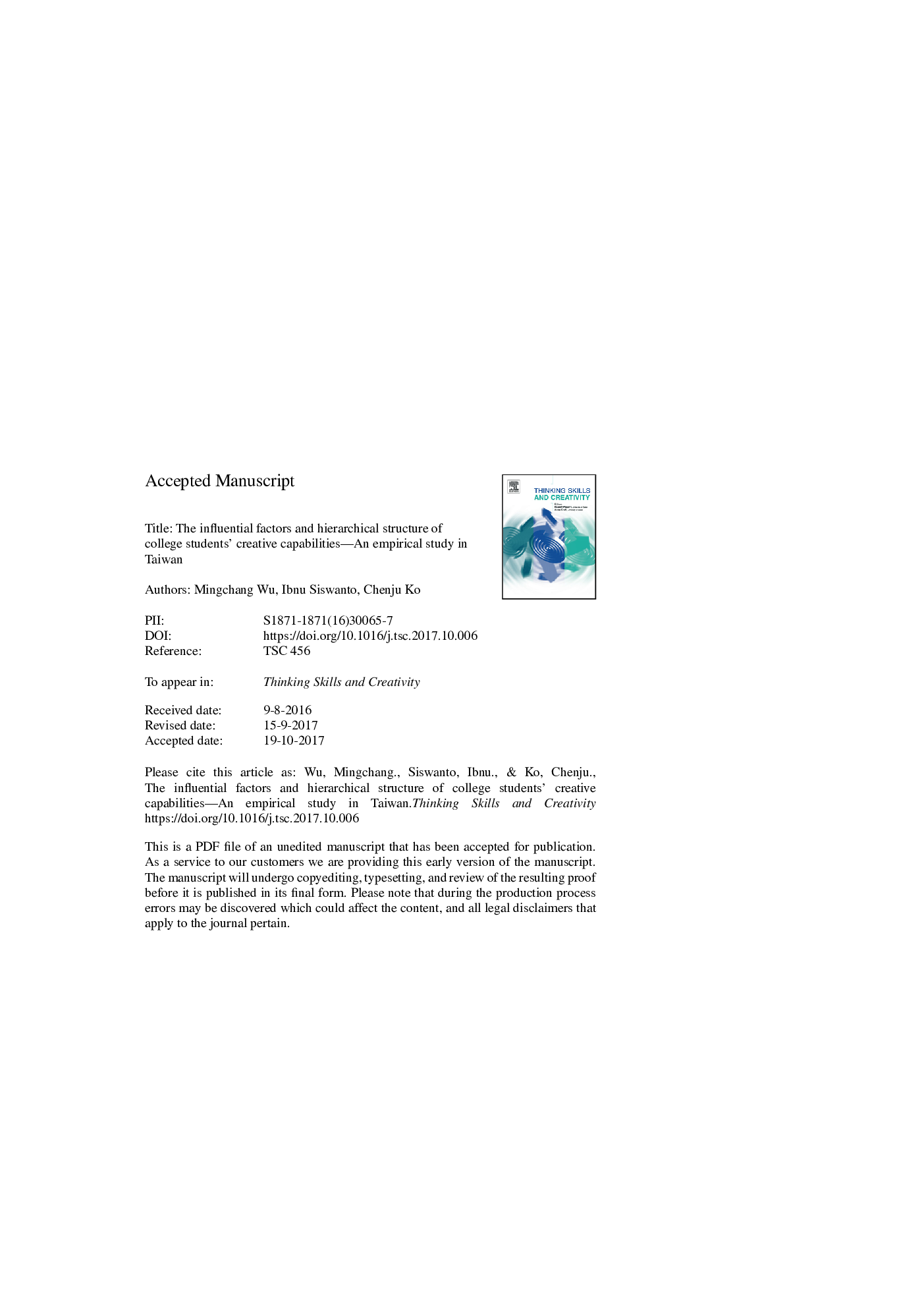| کد مقاله | کد نشریه | سال انتشار | مقاله انگلیسی | نسخه تمام متن |
|---|---|---|---|---|
| 6851945 | 1436833 | 2017 | 27 صفحه PDF | دانلود رایگان |
عنوان انگلیسی مقاله ISI
The influential factors and hierarchical structure of college students' creative capabilities-An empirical study in Taiwan
ترجمه فارسی عنوان
عوامل تاثیرگذار و ساختار سلسله مراتبی توانایی های خلاقانه دانشجویان دانشگاه - یک مطالعه تجربی در تایوان
دانلود مقاله + سفارش ترجمه
دانلود مقاله ISI انگلیسی
رایگان برای ایرانیان
کلمات کلیدی
دستاوردهای علمی، خلاقیت مؤثر، تفکر خلاقانه، خیال پردازی، خود کارآمدی،
ترجمه چکیده
مجموعه ای از مطالعات تجربی و نظریه های مرتبط نشان داد که خلاقیت، تخیل و خود کارآمدی عاطفی به طور جداگانه تفکر خلاق دانشجویی و پیشرفت تحصیلی را تقویت می کند که به اثرات تک فاکتور نشان می دهد. برعکس، مطالعه تجربی به طور همزمان با توجه به اثرات تعاملی میان این عوامل شخصیتی و همبستگی بر عملکرد دانش آموزان صورت نگرفت. بنابراین، این مطالعه به منظور ایجاد و آزمایش چارچوب نظری مبتنی بر ساختار سلسله مراتبی و مسیرهای تاثیرگذار نشان می دهد که چگونه خلاقیت عاطفی، تخیل و خود کارآمدانه تعاملی بر تفکر خلاق و موفقیت تحصیلی تأثیر می گذارد. داده ها با استفاده از پرسشنامه از 322 دانش آموز دانشگاه علم و صنعت ملی یونلین، تایوان جمع آوری شد. با استفاده از تجزیه و تحلیل مدلسازی معادلات ساختاری، این مطالعه نشان داد که مدل سلسله مراتبی قابل قبول است (با متناسب بودن مناسب) و مشخص شد که خلاقیت عاطفی دانش آموزان بالغ منجر به تفکر خلاق آنها از طریق تخیل و خودکارآمدی به عنوان واسطه ها می شود و پیوسته بر موفقیت تحصیلی دانش آموزان . این سازه های درون فردی مجددا مورد تایید قرار گرفت تا به طور قابل توجهی با یکدیگر ارتباط برقرار کنند و هم زمان بر موفقیت تحصیلی آنها تأثیر بگذارد. این نتایج به صورت گذشتهناپذیر و درونمایه پیشنهادات بیشتری را برای کشف برخی از رویکردهای به منظور افزایش تفکر خلاق دانشجویی و پیشرفت تحصیلی پیشنهاد می دهد، در حالی که با توجه به تعامل پیچیده عوامل داخلی و خارجی.
موضوعات مرتبط
علوم انسانی و اجتماعی
روانشناسی
روانشناسی رشد و آموزشی
چکیده انگلیسی
A series of empirical studies and related theories all declared that affective creativity, imagination, and self-efficacy separately enhance students' creative thinking and academic achievement, testifying to the single-factor effect. Conversely, there was no empirical study simultaneously considering the interactive effects among these personality factors and collaboratively affecting students' performance. Therefore, this study purports to establish and test a theory-driven framework of the hierarchical structure and influential paths indicating how affective creativity, imagination, and self-efficacy interactively affecting creative thinking and academic achievement. Data were collected through questionnaires from 322 students of the National Yunlin University of Science and Technology, Taiwan. Taking a structural equation modeling analysis, this study illustrated that the hierarchical model was acceptable (with good fits) and specified that higher students' affective creativity led to their creative thinking through imagination and self-efficacy as mediators, and continuously influenced students' academic achievement. These intrapersonal constructs were reconfirmed to be significantly related to each other and concurrently influenced their academic achievement. These conclusions both retrospectively and introspectively proposed further suggestions to explore some approaches to enhance students' creative thinking and academic achievement, while considering the complex interaction of intrapersonal and external factors.
ناشر
Database: Elsevier - ScienceDirect (ساینس دایرکت)
Journal: Thinking Skills and Creativity - Volume 26, December 2017, Pages 176-185
Journal: Thinking Skills and Creativity - Volume 26, December 2017, Pages 176-185
نویسندگان
Mingchang Wu, Ibnu Siswanto, Chenju Ko,
